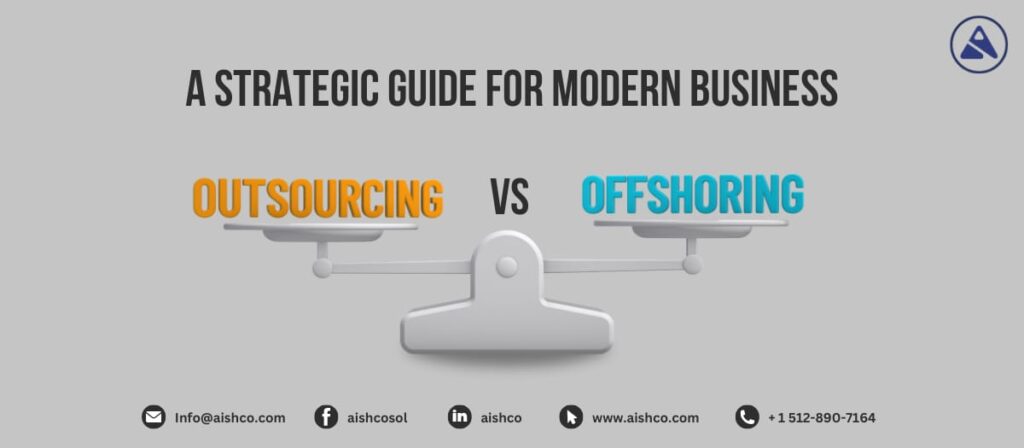
Outsourcing vs. Offshoring: A Strategic Guide for Modern Businesses
Share post on
Table of Contents
Businesses face the critical decision of adopting outsourcing vs. offshoring to streamline their operations. They are constantly exploring innovative strategies to optimize operations, reduce costs, and enhance efficiency. Two widely adopted methods are outsourcing and offshoring. While both strategies aim to improve business performance, their approaches, objectives, and implementation differ significantly.
This guide explores the nuances of outsourcing vs. offshoring, helping businesses select the strategy that aligns best with their objectives.

Common Outsourced Functions
- IT support and software development
- Digital marketing, including SEO and social media management
- Accounting, payroll, and financial services
- Customer service and call center operations
Benefits of Outsourcing
- Cost Savings
One key aspect of outsourcing vs. offshoring is how outsourcing reduces overhead costs, eliminating the need for infrastructure investments. - Access to Specialized Expertise
Outsourcing allows companies to partner with experts, an essential point when evaluating outsourcing vs. offshoring - Improved Focus on Core Operations
By opting for outsourcing in the outsourcing vs. offshoring debate, businesses can focus on primary objectives while delegating routine tasks. - Scalability
Flexible outsourcing agreements enable businesses to adjust resource levels based on project demands.
Example of Outsourcing
A startup might outsource its social media marketing to an agency that ensures consistent content creation, audience engagement, and analytics tracking, helping the business maintain a strong online presence.

Offshoring involves relocating specific business processes or operations to another country. This approach is often chosen to take advantage of lower costs, access skilled labor, or leverage favorable economic conditions. Unlike outsourcing, offshoring typically involves establishing a dedicated team or facility in the chosen location.
Common Offshored Operations
- mobile development
- Software and product development
- Manufacturing and production
- Data entry and back-office processes
Benefits of Offshoring
Angular, maintained by Google, is renowned for its robust architecture. It is a complete solution that includes tools for dependency injection, routing, and two-way data binding.
- Significant Cost Reductions
Labor costs in countries like Pakistan, India, the Philippines, and Eastern Europe are often much lower than in Western nations. - Access to a Global Talent Pool
Offshoring provides businesses with access to diverse, highly skilled professionals who might not be available locally. - Round-the-Clock Operations
With teams spread across different time zones; businesses can ensure continuous productivity and faster project completion.
Example of Offshoring
A U.S. based software company sets up a development center in Pakistan to benefit from the country’s vast pool of talented software engineers.
Key Differences Between Outsourcing and Offshoring
| Criteria | Outsourcing | Offshoring |
|---|---|---|
| Primary Goal | Delegate specific tasks | Relocate operations |
| Cost Efficiency | Moderate | High |
| Control | Limited | Moderate |
| Expertise Focus | Vendor expertise | Skilled labor at lower costss |
Hybrid Approach: Combining Outsourcing vs. Offshoring
Rather than choosing between outsourcing vs. offshoring, many businesses adopt a hybrid approach. This strategy leverages the strengths of both models for maximum efficiency. Businesses often combine outsourcing and offshoring strategies to maximize benefits. This hybrid model integrates the expertise of outsourcing with the cost efficiency of offshoring.
Advantages of a Hybrid Model
- Optimized Cost Management
By outsourcing high-skill tasks locally and offshoring routine processes, businesses achieve a perfect balance of quality and cost. - Global Flexibility
Expanding operations across regions ensures greater adaptability and market reach. - Risk Mitigation
Diversifying locations reduces risks from regional economic instability or regulatory changes.
Example of a Hybrid Approach
Challenges of Outsourcing and Their Solutions
- Quality Control Ensuring the quality of deliverables from external vendors can be difficult. Solution: Define key performance indicators (KPIs) and conduct regular evaluations.
- Communication Barriers Differences in time zones, languages, or expectations may cause delays or misunderstandings. Solution: Use collaboration tools and schedule regular updates to streamline communication.
- Data Security Risks Sharing sensitive information with external providers increases vulnerability to breaches. Solution: Employ strict data protection protocols and non-disclosure agreements (NDAs).
Challenges of Offshoring and Their Solutions
Offshoring involves unique complexities that require careful management:
- Cultural and Communication Gaps Varied work styles or cultural differences can hinder collaboration. Solution: Provide cross-cultural training for both onshore and offshore teams.
- Time Zone Coordination Overlapping work hours between teams in different time zones can be challenging. Solution: Use project management tools like Trello or Asana to align schedules.
- Regulatory Compliance Understanding and adhering to labor laws and trade regulations in offshore locations is critical. Solution: Partner with local legal advisors for guidance.
Best Locations for Outsourcing vs. Offshoring
The choice between outsourcing vs. offshoring depends on the goals, costs, and specific requirements of a business.
Top Outsourcing Destinations
- North America: Best for high-quality expertise and proximity to clients.
- Eastern Europe: Renowned for exceptional software developers and competitive rates.
- Asia: Popular for IT and customer service outsourcing at affordable prices.
Top Offshoring Destinations
- India: Ideal for IT services and software development.
- Philippines: Known for excellent customer support and back-office operations.
- Mexico: A preferred nearshore option for U.S.-based companies due to proximity.
How Aishco Solutions Combines Outsourcing and Offshoring
Our Key Offerings
- Customized Services: Customized strategies to address unique business challenges.
- Access to Top Talent: A network of professionals across leading outsourcing and offshoring hubs.
- Streamlined Operations: Advanced tools and methodologies for seamless integration of global teams.
Outsourcing vs. Offshoring in Technology
Key Tools for Success
- Communication: Slack, Zoom, Microsoft Teams
- Project Management: Jira, Asana, Monday.com
How Technology Helps
- Customized Services: Customized strategies to address unique business challenges.
- Access to Top Talent: A network of professionals across leading outsourcing and offshoring hubs.
- Streamlined Operations: Advanced tools and methodologies for seamless integration of global teams.
Making the Right Choice: Outsourcing, Offshoring, or Both?
When deciding between outsourcing, offshoring, or a combination of both, it is essential to evaluate your business needs and objectives. Each strategy offers unique benefits and challenges, and understanding these differences can help you make an informed choice. Here’s a detailed breakdown of key factors to consider:
Factors to Consider
- Budget
Outsourcing works well for short-term or one-time tasks, as it reduces upfront costs and provides flexibility in resource allocation.
Offshoring is more suitable for long-term projects where maintaining lower operational costs is a priority. It can significantly reduce expenses related to infrastructure, labor, and other recurring costs. - Control
Outsourcing provides limited control over day-to-day operations since the external vendor manages tasks. This is often effective for non-core functions where micromanagement is not required.
Offshoring offers greater control, as offshore teams often act as an extension of your in-house operations. This approach works well for businesses that need close supervision and alignment with their internal processes. - Expertise Needs
Outsourcing is a preferred option for businesses needing immediate access to specialized expertise. It allows companies to utilize niche skills without long-term hiring or training commitments.
Offshoring, while taking more time to build expertise within offshore teams, ensures they become well-integrated with your business over time, delivering consistent and aligned results.
Decision Framework
To further simplify your choice, use the following decision matrix:
| Question | Outsourcing | Offshoring |
|---|---|---|
| Do I need short-term expertise? | Yes | No |
| Is cost the primary concern? | Sometimes | yes |
| Do I want greater control? | No | yes |
| Is the project duration long-term? | No | yes |
| Do I need seamless team integration? | Limited | Strong |
By carefully evaluating your priorities, whether they focus on cost-efficiency, operational control, or access to expertise, you can determine whether outsourcing, offshoring, or a combination of the two strategies will best meet your business objectives.
Conclusion
Making the right decision between outsourcing vs. offshoring is essential for achieving operational excellence. While both strategies offer unique benefits, understanding their differences ensures a better alignment with business goals. Outsourcing vs. offshoring involves distinct approaches: outsourcing allows companies to delegate specialized tasks to external experts, enabling them to focus on core operations without the burden of additional hiring or infrastructure. Offshoring, on the other hand, provides a strategic advantage through access to global talent and significant cost savings while maintaining a higher level of control over operations.
By leveraging a hybrid model that combines the strengths of both outsourcing vs. offshoring, businesses can maximize flexibility, optimize costs, and scale efficiently. This approach not only addresses immediate operational needs but also supports sustained growth and innovation. At Aishco Solutions, we specialize in delivering customized solutions for businesses grappling with this critical decision. Our expertise ensures you achieve optimal results, regardless of your chosen strategy.
For more insights, visit trusted resources like:
- Harvard Business Review on strategic management.
- McKinsey & Company for outsourcing trends.
- Statista for global outsourcing statistics.

Our Services
Our company specializes in custom web applications, providing solutions using the latest technologies. It develops innovative mobile apps for both iOS and Android platforms to engage users effectively. Expert business consulting services are available to enhance operations through modern technologies.In e-commerce, the company builds platforms to improve customer experience and boost online sales. Additionally, staff augmentation services offer skilled developers to support projects. Our digital marketing strategies focus on enhancing online presence and reaching target audiences across various applications.
Share post on
